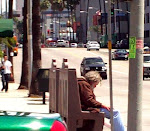.
I remember the moment, in Pershing Square, a vigil while the bishops held their national meeting in the L.A. Biltmore across the street. I was disheveled, bloated and fat and self esteem? None. This was my second time finding SNAP. First time I'd been a warrior, moved a hundred miles to be closer to a SNAP meeting in Oakland, started a second daytime meeting in San Francisco. Wrote letters, started printing things out that I found on this new thing the Internet.
That was mid 1990s.
Now it was 2006, there had been a murder in my family so I hadn't done SNAP for several years, now I could come back, all the chaos and insanity in that part of my life was finally ending and I could start paying attention to this priest thing again.
Barbara Blaine sat next to Mary Grant and I finally got a chance to talk to them. I was in awe of them, gazing up at them, probably looked pretty pathetic.
I said, "It feels so good to be able to send out a letter to the editor and sign it Kay Ebeling, SNAP Los Angeles."
Blaine and Grant looked at each other then looked at me, and said simultaneously:
"You can't."
Then they explained why I couldn't say I was a member of SNAP but I really don't remember what the reasoning was. Just that I gave them the authority, figured they must know what they are doing, so they must be right.
So, for all the people who tell me, just do something on your own and call it SNAP like they did, you are forgetting that you started that in the 1990s or early 2000s.
Apparently SNAP has changed since then, it's much more controlled from the top, there are a lot more secrets kept than were in 1995.
I'm writing from my experience. Not to whine or ask for pity, but to point out that no one in this movement deserves sainthood. Everyone among us deserves to be criticized if they are putting out false information.
Saying SNAP is a "support network" is two false statements. The support is not really there. And the network does not exist at all, it's a hologram.
I know people are rankled but as long as it's impossible to point out anything SNAP does wrong, they will continue to do things in "the way we've always done it," and the same mistakes get made.
NO ONE is above criticism.
Even me. I hear it and consider it when it's legitimate.
Since SNAP told me lies, misdirected me about the L.A. Clergy Case hearings, and I'm one journalist / survivor, it makes me really wonder how many other people were misdirected by SNAP around that time, and why.
If anything, I know making these statements about SNAP makes me look petty in a lot of people's eyes. If it was about me-me-me, believe me, I would not have posted this story because I know I'm losing "friends."
This is me not wanting to see the same mistakes and screw-ups continue in SNAP.
It's me saying, why doesn't someone go in and reorganize, update, and set genuine Goals at SNAP instead of letting it continue in its current continuous state of disarray.
How is that whining or pity potting. Yet one of SNAP's most vocal midwest spokesmen is hounding me now that I'm on a pity pot.
I posted this idea:
Set up a trust, a fund donated from settlements, and let survivors who did not get settlements apply to the fund for grants, to start small businesses or go back to school.
And Mr. SNAP from Minnesota in seconds chimed back that I'm on a pity pot and all I care about is me-me-me.
What's wrong with the idea of setting up a trust for the rest of the survivors? How is that just caring about me-me-me and being on a pity pot?
I think it's a damn good idea, and something SNAP should have done and still couuld do.
Instead of their eternal pat response, "We don't do that."
Nothing will improve until we fix the broken parts.
Re Missing Link collection below: Email editor Jay Nelson of Albuquerque at jay@sarabite.info CLICK IMAGES to enlarge
Monday, February 8, 2010
Subscribe to:
Post Comments (Atom)







No comments:
Post a Comment